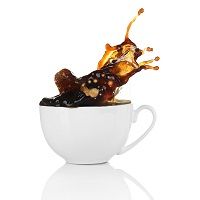Article
Coffee Is Not a Carcinogen… Unless it's Very Hot
Author(s):
You might want to stop asking your barista to make your coffee extra hot.

Do you ever go to Starbucks or Dunkin Donuts and ask the barista to make your drink extra hot so that it will still be warm when you get to your destination? A new study published in The Lancet Oncology warns about this dangerous practice.
A team of 23 scientists from ten countries, part of the International Agency for Research on Cancer (IARC), the cancer agency of the World Health Organization (WHO), analyzed the carcinogenicity of coffee, mate tea, and very hot beverages — particularly its impact on the development of esophageal cancer (spelled “oesophageal” in the UK where the study was derived).
“Smoking and alcohol drinking are major causes of oesophageal cancer, particularly in many high-income countries. However, the majority of oesophageal cancers occur in parts of Asia, South America, and East Africa, where regularly drinking very hot beverages is common and where the reasons for the high incidence of this cancer are not as well understood,” Christopher Wild, PhD, director of the IARC, said in a news release.
- Related: Coffee Drinkers Have Less Multiple Sclerosis
The team evaluated more 1,000 studies and found no link between coffee on its own and cancer; however, drinking “very hot beverages” was deemed to be probably carcinogenic to humans.
But what does “very hot” mean? One study conducted in China found that drinking a beverage at 158°F increased the risk of oesophageal cancer.
On the other hand, there was not a connection when it came to mate tea. Neither cold nor hot mate swayed the scale one way or the other. Notably, data was inconclusive on the impact of plain hot water on its own.
“These results suggest that drinking very hot beverages is one probable cause of oesophageal cancer and that it is the temperature, rather than the drinks themselves, that appears to be responsible,” Wild explained.
So according to this study, very hot coffee is likely to increase the risk oesophageal cancer. However, it did not have an impact on cancer of the female breast, prostate, and pancreas, and actually, it showed to decrease the risk for cancers of the liver and uterine endometrium.
Beverages served in the United States and Europe are typically not as hot as places in Asia and South America, but it may still be something to keep an eye on.
Also on MD Magazine >>> Using Caffeine to Slow Progression of Hepatitis C and Hepatic Fibrosis





